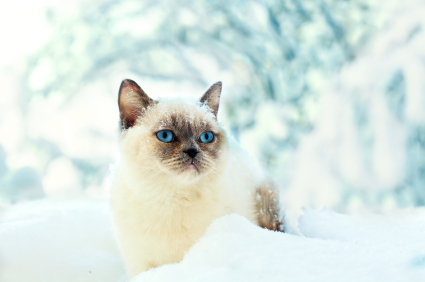Keeping Your Pet Safe: Ice and Snow
 Cold winter weather, along with ice and snow, is never unexpected in Michigan come January and into early Spring. With cold, slippery conditions and the extremes of winter weather come unique dangers and concerns for our pets. Don’t risk your pet’s health and safety when the mercury drops. Be on the lookout for these common injuries and risks:
Cold winter weather, along with ice and snow, is never unexpected in Michigan come January and into early Spring. With cold, slippery conditions and the extremes of winter weather come unique dangers and concerns for our pets. Don’t risk your pet’s health and safety when the mercury drops. Be on the lookout for these common injuries and risks:
The Dreaded Cruciate Ligament Injury
Just like football players, pets can injure or tear their anterior (or cranial) cruciate ligament in their knees. In people this is called an ACL injury, and for pets the injury is much the same.
Pets that suffer from an injury to this ligament will often be in a lot of pain and unwilling to use the affected limb. Injuries often happen during slick conditions and when a pet fails to “warm up” his or her muscle adequately before going outside.
Use caution when it is slick outside, clearing areas for your pet to walk and go about their business, if possible.
Neck Injuries
Lunging forward quickly, particularly on a leash (like when chasing down that darn squirrel in a slick and snowy yard) can cause damaging stress on the neck. Put in some extra time into training your dog to heel, and consider using a well-fitted harness over a collar.
Paw Pad Injuries
Salt and ice can be hard on tender paws. Prolonged contact with de-icers can cause chemical burns, especially when the granules become trapped between the paw and fur.
Use pet-friendly products on your property and keep your pet off salty roads and sidewalks as much as possible. And be certain to wipe the paws and belly before your pet comes indoors.
Paw waxes, such as Musher’s Secret, and booties can also protect your pet from sharp ice and snow. Likewise, consider having the hair between your pet’s paw pads trimmed, as it can collect snow and ice.
Antifreeze Ingestion
Antifreeze is extremely toxic to pets and, to top it off, it tastes good to pets too. Be certain to clean up spills immediately, no matter how small, and keep this toxic fluid capped and out of your pets’ reach. Even a teaspoon of the stuff can send pets into kidney failure.
Frostbite and Hypothermia
You aren’t the only one who gets cold outdoors this time of year. Despite your pets’ fur coat, pets can suffer from hypothermia and frostbite, just like us.
Use caution when outdoors, especially with young, elderly, or underweight pets. Be on the lookout for shivering and slower breathing. Never leave a pet outdoors for prolonged periods without shelter from the elements, plenty of food, and unfrozen drinking water – if at all.
If you have any other questions regarding your pet’s health and safety during the cold months ahead, please don’t hesitate to contact us. We want both you and your pet to be safe this winter, and to be able to enjoy the summer months ahead.


